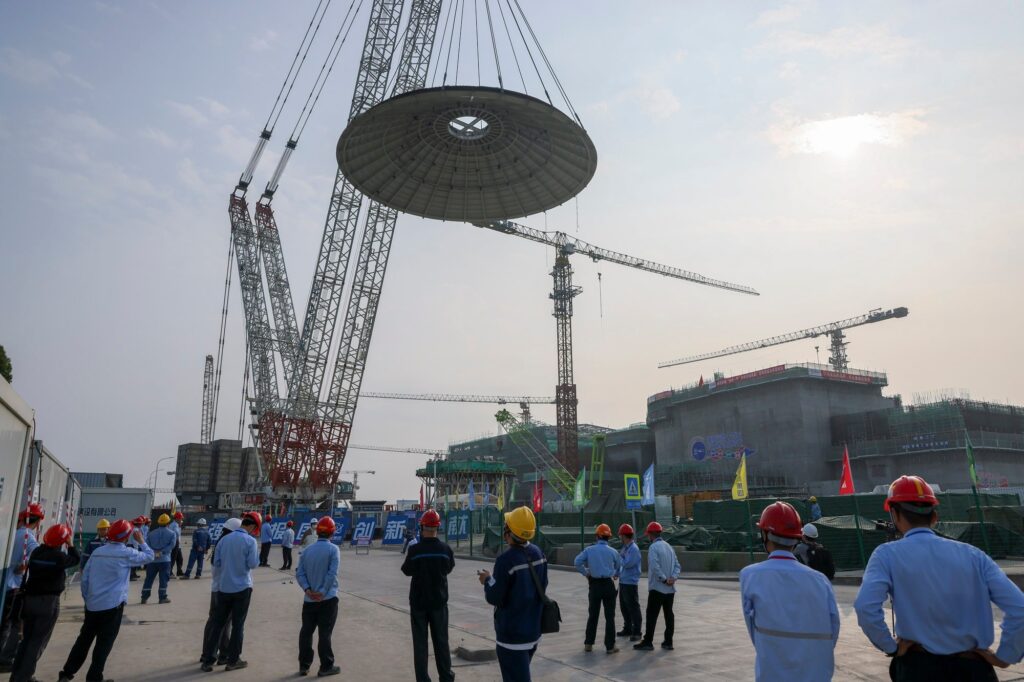As Donald Trump steps on to the tarmac in Saudi Arabia at the start of his Gulf tour, energy offers a key area for cooperation.
GCC investments into US oil and gas and powering data centres, along with collaboration on strategic minerals, are likely areas for dealmaking. But the most radioactive of all is the issue of nuclear power.
Nuclear is one area where the US has plenty to give. Its legacy of involvement in nuclear generation gives it interests in a range of technologies. It is the most active country for current development of small modular reactors (SMRs), of a wide variety of sizes and designs. These are hoped to overcome the problems of legacy nuclear development by being safer, faster to construct and cheaper.
The Gulf hosts three current or aspiring nuclear energy users. One is a US adversary, Iran, whose only reactor, the Russian-built Bushehr on the northeastern Gulf coast, started generating in 2013.
In contrast, the UAE worked closely with the US on its own nuclear power programme and has built four APR1400 reactors with Korea Electric Power Corporation (Kepco), South Korea’s state-owned power company.
It began nuclear generation in August 2020. The UAE is considering building additional reactors, both conventional and SMRs, and investing internationally.
Nuclear power, though not especially cheap, has been very helpful in driving rapid decarbonisation of the UAE’s electricity sector and providing a reliable, day- and year-round supply to complement the booming solar sector.
The third of this trio, Saudi Arabia, has since at least 2010 been seeking civil nuclear power. This would help it lower its heavy reliance on burning its own oil for power. Four companies were reportedly invited to bid for construction of its first reactor in 2022, all of them state-owned, from Russia, China, France and South Korea. Discussions were restarted in April.
But for Washington to cooperate, Riyadh would need a “123 Agreement”, named after the relevant section of the UN Atomic Energy Act of 1954. The UAE signed such a document in 2009 in the early stages of its own nuclear programme.
This has implications for other partners, too. A dispute over the intellectual property for the APR1400 design, between Kepco and the US’s Westinghouse, was settled in January. The same month, the US and South Korea signed an agreement on principles for the export of nuclear technology.
Such cooperation means Kepco could face obstacles to the use of American technology if it were selected as the kingdom’s preferred partner.
Ruling out both itself and ally South Korea, so losing ground to Russia or China in this strategic sector, is worrying for the US. As well as Bushehr, Russia’s Rosatom is already constructing reactors in several countries, including Egypt, Turkey and Bangladesh.
The “gold standard” 123 agreement, like the UAE’s, forbids domestic nuclear enrichment or reprocessing, to limit the potential for weapons proliferation. But Saudi Arabia, hoping to develop its own uranium resources, wants to retain access to the full fuel cycle – ie including the right to enrich.
Earlier this month, US vice-president JD Vance asked rhetorically, “Which regime in the world has civil nuclear power and enrichment without having a nuclear weapon? The answer is no one.”
This was, of course, incorrect since Germany, Japan, Argentina, Brazil and the Netherlands all enrich without having nuclear arms.
But Vance was referring to Iran, signalling that the US really wanted to remove its ability to enrich entirely, rather than limiting it as in President Obama’s nuclear deal of 2015.
“We really think that, if the Iran domino falls, you’re gonna see nuclear proliferation all over the Middle East,” he said.
If the White House sees enrichment as inextricably linked to weapons proliferation, that remains an obstacle to a deal with Saudi Arabia. T
he Trump administration seems to have hoped that a 123 Agreement that allows enrichment could have been the necessary carrot to bring Riyadh to normalise relations with Israel.
But this is out of reach while Israel continues to ignore the ceasefire in Gaza and to blockade the territory. Now it appears that Washington has dropped this idea. Other parts of the package include Saudi wishes for (conventional) weapons and security guarantees.
Conversely, if the US concedes enrichment to Riyadh, it is likely that the UAE would then be able to claim a similar right under its 123 Agreement, although it may not exercise that.
A compromise could be an enrichment facility on Saudi soil but under US control, though Riyadh may still feel that infringes its sovereignty and freedom of action.
Trump has, of course, teased the prospect of some non-specific big deal during his visit. With the recent progress in gas and solar energy, prompt access to nuclear power is not essential to Riyadh’s energy economy. But it is a key part of its strategic and security goals.
The Saudis may not be happy if they are fobbed off with modest further steps in technical talks. On the other hand, if anyone is inclined to rip up seven decades of consistent US policy, it is the current incumbent of the White House.
Robin M Mills is CEO of Qamar Energy, and author of The Myth of the Oil Crisis



